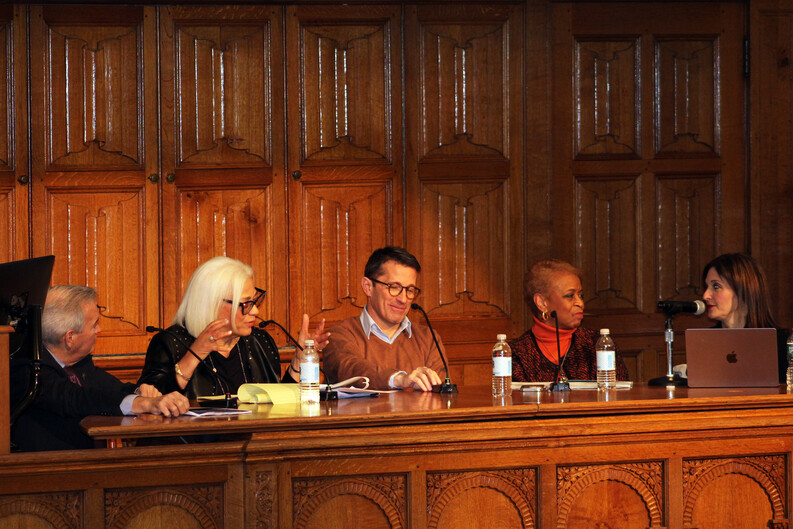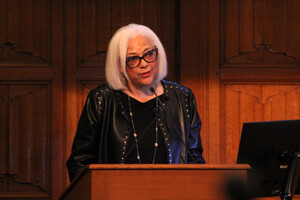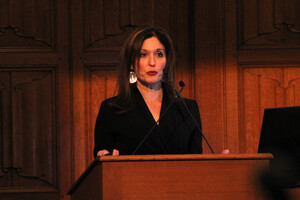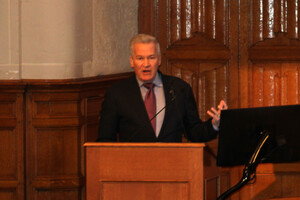Experts Discuss Organ Transplant System Reform With Focus on Racial Equity

President Joe Biden signed the Securing the U.S. Organ Procurement and Transplantation Network Act into law in September 2023. That act, aimed at reforming the U.S. organ transplantation system, has not received much public attention despite its potential to have a significant impact on many Americans’ lives. Thus, experts say, important questions remain: How does the transplantation system operate and why is there a need for reform in the first place?
On Feb. 7, the Solomon Center for Health Law and Policy4 hosted “Organ Allocation Reform: Equity, Transparency, Governance,” a panel event in which experts addressed these very questions. Panelists explored the problems and proposed changes to the ways in which organs for transplantation are allocated across the country.

Renée Landers, Professor and Faculty Director of the Health and Biomedical Law Concentration and Master of Science in Law at Suffolk Law School, started by providing background on the organ transplantation system. Landers was a member of the National Academies of Sciences committee that authored a 2022 report examining the fairness, equity, transparency, and cost-effectiveness of the U.S. system. One of the report’s primary conclusions, Landers explained, was that the system suffers from severe inequities in that certain patient groups. Most notably, people of color receive organ transplants at a disproportionately lower rate than other people with similar medical needs. According to Landers, another problem is that many donated organs are not being used, which raises concerns about system inefficiency.
Landers concluded by reviewing key developments since the report was issued — most significantly, the federal legislation signed by Biden in September. That legislation’s goal, Landers noted, was to reduce inefficiencies and promote equity by allowing more contractors to participate in the administration of the transplantation system.

Next was Alexandra Glazier, the President and CEO of New England Donor Services, which runs an Organ Procurement Organization (OPO. Glazier described the legal infrastructure underlying the transplantation process, explaining that there are multiple layers of regulation at both the federal and state levels. According to Glazier, OPOs are part of this interrelated system, with the goal to help coordinate the organ transplantation process. Glazier, who also serves as an assistant professor at Brown University School of Public Health, pointed to the need to balance ethical issues with real-world circumstances.
Glazier noting that although many people are still waiting for an organ transplant, there has been a significant increase in successful transplantations over the past 10 years.
“We are impatient and optimistic,” she said.

The next speaker was Dr. Richard Formica, a Professor of Nephrology and Transplant Surgery at Yale School of Medicine. Formica, who also serves as the Vice President/President-Elect of the Organ Procurement and Transplantation Network, began by noting that there are currently almost 90,000 people in the United States waiting for a kidney transplant. The primary challenge, Formica explained, is that there are not enough organs to meet the need. Formica presented some of the overarching ethical dilemmas that this “environment of scarcity” raises: How should we decide who receives the kidney among those who need it? And how do we prioritize knowing that not everyone is going to receive the organ?
Formica noted that the lower rate of transplantations among Black people resulted in part from the way in which wait time for donation was calculated. White people used to be referred for dialysis earlier than Black people, which exacerbated the racial disparities surrounding the U.S. organ transplantation system. To rectify this problem, Formica concluded, policymakers have changed the calculation formula that determines eligibility for transplantation.

LaVarne Burton, President and Chief Executive Officer of the American Kidney Fund, broadened the lens. Burton asked not only how to rectify racial disparities in the waitlist system but also why so many people need an organ transplantation in the first place. Providing a patient perspective, Burton noted that despite the prevalence of kidney diseases, “we have no national standards to identify, detect, and treat” such diseases. Burton noted that early detection is key for prevention. In considering the inequities in the system, she emphasized that kidney disease disproportionally affects Black people, and that diabetes and high blood pressure are prevalent among people of color. Burton added that while the change in the wait-time calculation described by Formica was important, the percentage of people of color receiving donated organs has not significantly increased.

Dr. David Mulligan, Professor of Surgery (Transplant) at Yale School of Medicine and a past President of the Organ Sharing/Organ Procurement & Transplantation Network, spoke next. Mulligan noted that the problem of unused organs for transplantation stems in part from logistics — that is, challenges in transferring of an organ from point A to point B. One way to improve the system, Mulligan suggested, is to harness new technologies and artificial intelligence. For example, some technologies may allow physicians to improve donated organs or to store and freeze others. The ultimate goal, Mulligan said, is to find ways to expedite placement and increase organ utilization. To make this happen, he concluded, the federal government ought to provide sufficient funding for the system to operate successfully.
The event was co-sponsored by the Yale Health Law and Policy Society and Yale Black Law Students Association.


